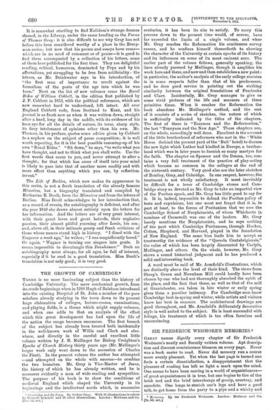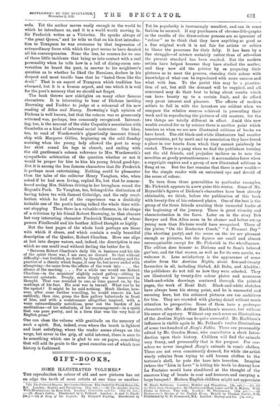SIR FREDERICK WEDMORE'S MEMORIES.*
GREAT names dignify every chapter of Sir Frederick Wedmore's neatly and fluently written volume. Apt descrip. tion and discreet reminiscence blossom on every page. Never was a book easier to read. Never did memory ran a course more evenly pleasant. Yet when the last page is turned one feels a certain dissatisfaction, a disappointment that the pleasure of reading has left so light a mark upon the mind. One seems to have been moving in a world of acquaintances— of great acquaintances it is true, but one begins to tire of the brisk nod and the brief interchange of gossip, courtesy, and anecdote. One longs to stretch one's legs and have a good talk, to get home from the party to a pipe and a whisky and • Memories. By Sir Frederick Wedmore. London : Methuen and Co. [7e. 6d. net.]
soda. Yet the author moves easily enough in the world to which he introduces us, and it is a world worth moving in.
Sir Frederick writes as a Victorian. He speaks always of "the great Queen," and he tells us that on his first introduc- tion to Tennyson he was overcome by that impression of extraordinary force with which the poet seems to have dazzled all his contemporaries. None the less, he rescues for us one of those little incidents that bring us into contact with a real personality when he tells how in a lull of dining-room con- versation he heard the poet, in answer to his neighbour's question as to whether he liked the Russians, declare in his deepest and most terrific bass that he "hated them like the devil." That is an aspect of Tennyson which tradition has obscured, but it is a human aspect, and one which it is well for the poet's memory that we should not forget.
The book throws new sidelights on many other famous characters. It is interesting to hear of Dickens inviting Browning and Fechter to judge at a rehearsal of his new reading of Sikes and Nancy. Browning's high opinion of Dickens is well known, but that the esteem was so generously returned was, perhaps, less commonly recognized. Interest- ing, too, is the account of the elder Coquelin's association with Gambetta as a kind of informal social instructor. One likes, too, to read of Wordsworth's gigantically innocent friend- ship with Margaret Galles, beginning on the cold Sunday morning when the young lady allowed the poet to wrap her skirt round his legs in church, and ending with the old gentleman's solemn reference to Mrs. Wordsworth's sympathetic arbitration of the question whether or not it would be proper for him to kiss his young friend good-bye. But it is among the less famous characters that Sir Frederick
is perhaps most entertaining. Nothing could be pleasanter than the tales of the collector Henry Vaughan, who, when
asked if he had seen Irving, replied No, but that he remem- bered seeing Mrs. Siddons driving in her brougham round the Regent's Park. To Vaughan, too, belonged the distinction of having taken tea with Samuel Coleridge, and the only recol- lection which he had of the experience was a decidedly irritable one of the poet's having talked the whole time with- out stopping Then there is a valuable reference, in the shape of a criticism by his friend Robert Browning, to that obscure but very interesting character Frederick Tennyson, of whose powers FitzGerald and his brother Alfred thought so highly. But the best pages of the whole book perhaps are those with which it closes, and which contain a really beautiful description of the Quaker, Robert Charlton. Here one slips at last into deeper waters, and, indeed, the description is one which no one could read without feeling the better for it.
"Between Robert Charlton's daily life in business and his life of the spirit there was, I am sure, no discord. So that without difficulty—but fortified, no doubt, by thought and reading and the practice of a charity which began, it may be, but never ended with almsgiving—he came from the affairs of the week into . . . the silence of the meeting. . . . For a while one would see Robert Charlton—in the ministers' slightly raised gallery—sitting in reverent quietude. Deeply, more deeply was he immersed in thought. That was revealed to one, as time passed on, by the workings of his face. His soul was in travail. What was to be the upshot? It might be he said nothing. Much likelier, how- ever, after some further wrestling, ho would remove his hat suddenly, then rise, grasp the firm gallery balustrade in front of him, and with a countenance altogether inspired, with a voice extraordinarily melodious, pour out the burden of his meditations—of his solicitude, of his encouragement—in a spirit that was pure poetry, and in a form that was the very best of English prose."
One can close the volume with gratitude on the memory of such a spirit. But, indeed, even where the touch is lightest and least satisfying, where the reader seems always on the verge, but never in the grip, of solid interest, there is sure to be something which one is glad to see on paper, something that will add its grain to the great cumulus out of which true history is fashioned.



























































 Previous page
Previous page